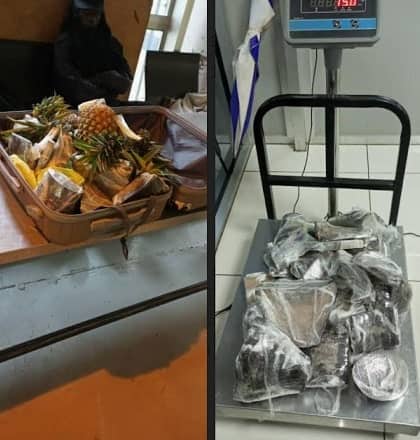On May 21, 2022, the Uganda Wildlife Authority (UWA) canine unit sniffed out Al-Maamari Maged Mutahar Ali, a Yemeni national, who was then arrested at Entebbe International Airport with 26 pieces of rhino horn weighing 15 kilograms at 0310 hours during luggage check by the UWA canine unit that is stationed at the airport.
According to UWA Communications Manager, Hangi Bashir, the rhino horns were concealed in food items to disguise their identity, but UWA’s highly trained dogs were able to detect them.
The suspect was handed over to aviation police and at the airport for further management of the case until the accused was tried and sentenced to pay a fine of UGX 60 million (USD 15,708). The court further ordered for his deportation last week on September 14, 2022.
His driver, Abubakar Mustafa, was sentenced to pay a fine of UGX 20 million (USD 5,236) for attempted export of wildlife without a permit and a caution for conspiracy to commit a felony.
The motor vehicle license registration UBH 194E that the 2 used in commission of the offenses was forfeited to UWA.
“We urge the public to desist from engaging in wildlife crimes.”
“Over the last 25 years of UWA’s existence, the institution has built capacity to detect and appropriately engage those involved in wildlife crime such as wildlife trafficking among others and ensure they face the law. UWA will continue to make Uganda a dangerous place for anyone involved in wildlife trafficking,” said Bashir.
Barely two weeks before, the Standards, Utilities and Wildlife Court sentenced a Congolese national identified as Mbaya Kabongo Bob to 7 years in jail for each of 2 counts of importing wildlife specimens into Uganda without a valid license and unlawful possession of protected wildlife species contrary to sections 62(2),(a)(3) and 71(1),(b) of the Uganda Wildlife Act 2019 respectively. The Wildlife Act of 2019 provides for up to a life sentence and a fine of UGX 20 billion (USD 5.2 million), or both, for wildlife crime involving endangered species.
In May 1997, Rhino Fund Uganda (RFU) was founded following the initiative of Ray Victorine and Dr. Eve Abe whose efforts in bringing back the rhino to Uganda were instrumental in reversing the extinction of rhinos suffered during the years of insecurity. Since its establishment in 2005, a successful breeding program has grown the number of rhinos at the Sanctuary to 32. The sanctuary is conveniently located 176 km (100 miles) north of Kampala enroute to Murchison Falls National Park and provides an excellent break for stopovers.
In August 2015, the late Minister of Tourism Wildlife and Antiquities (MTWA), Honorable Maria Mutagamba, launched the 10-year Rhino Strategy setting a robust legal framework and rhino conservation strategy aligning with the 1995 Constitution of Uganda which inter alia mandates the state including local governments to create and develop national parks, wildlife reserves, and recreation areas and ensure conservation of natural resources.
The black rhino is listed among species that are the most endangered among CITES Convention International trade in Endangered Species, Appendix I. The southern white rhino is listed in Appendix II among species that are not necessarily now threatened with extinction but that may become so unless trade is closely controlled. The northern white rhino, however, has virtually been driven to the brink of extinction since the last 2 remaining females in Ol Pejeta Conservancy in Kenya were retired from the breeding program in 2021.
Rhino horn is made up of keratin, the same protein that makes up our hair and fingernails that we discard regularly. Paradoxically, its value has surpassed that of gold. It is much sought after in China and Vietnam where it is used for medicinal purposes and is thought to have potent properties.
In recent years, Yao Ming, the Chinese basketball player who played in the NBA for the Houston Rockets, has led the campaign to stop elephant and rhinoceros poaching. As a goodwill ambassador to WildAid, a nonprofit dedicated to ending illegal wildlife trading, Yao took a trip to Kenya in 2012 where he spent several days interacting with wildlife officials and seeing some of the effects of poaching firsthand.
WHAT TO TAKE AWAY FROM THIS ARTICLE:
- Barely two weeks before, the Standards, Utilities and Wildlife Court sentenced a Congolese national identified as Mbaya Kabongo Bob to 7 years in jail for each of 2 counts of importing wildlife specimens into Uganda without a valid license and unlawful possession of protected wildlife species contrary to sections 62(2),(a)(3) and 71(1),(b) of the Uganda Wildlife Act 2019 respectively.
- As a goodwill ambassador to WildAid, a nonprofit dedicated to ending illegal wildlife trading, Yao took a trip to Kenya in 2012 where he spent several days interacting with wildlife officials and seeing some of the effects of poaching firsthand.
- Late Minister of Tourism Wildlife and Antiquities (MTWA), Honorable Maria Mutagamba, launched the 10-year Rhino Strategy setting a robust legal framework and rhino conservation strategy aligning with the 1995 Constitution of Uganda which inter alia mandates the state including local governments to create and develop national parks, wildlife reserves, and recreation areas and ensure conservation of natural resources.























